牛津译林版七年级下册 Unit 7 Revision(Topic Abilities )(共27张PPT)
文档属性
| 名称 | 牛津译林版七年级下册 Unit 7 Revision(Topic Abilities )(共27张PPT) | 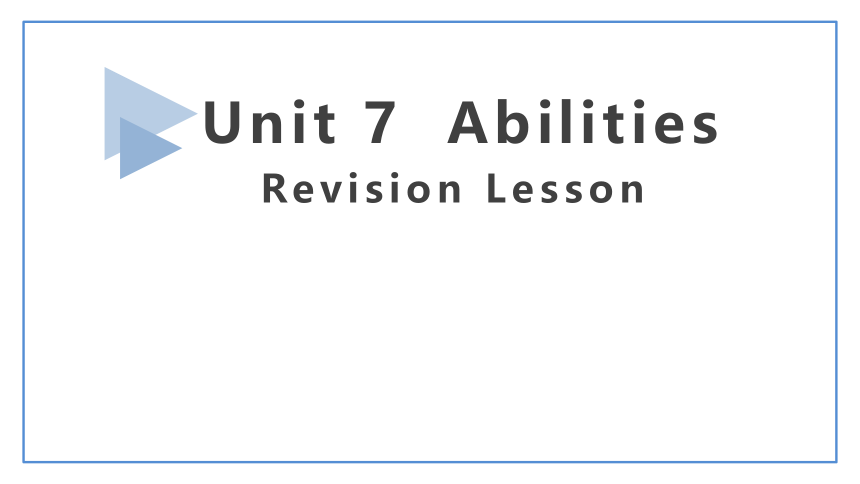 | |
| 格式 | pptx | ||
| 文件大小 | 1006.3KB | ||
| 资源类型 | 教案 | ||
| 版本资源 | 牛津译林版 | ||
| 科目 | 英语 | ||
| 更新时间 | 2022-05-30 16:25:50 | ||
图片预览

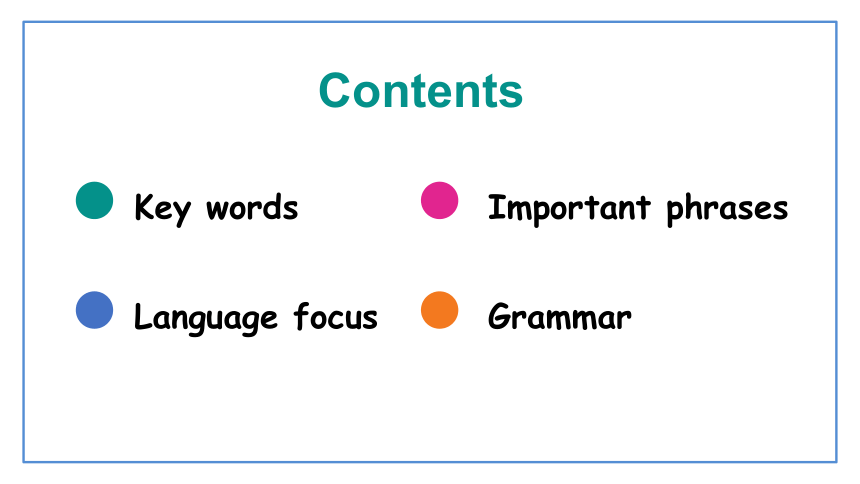
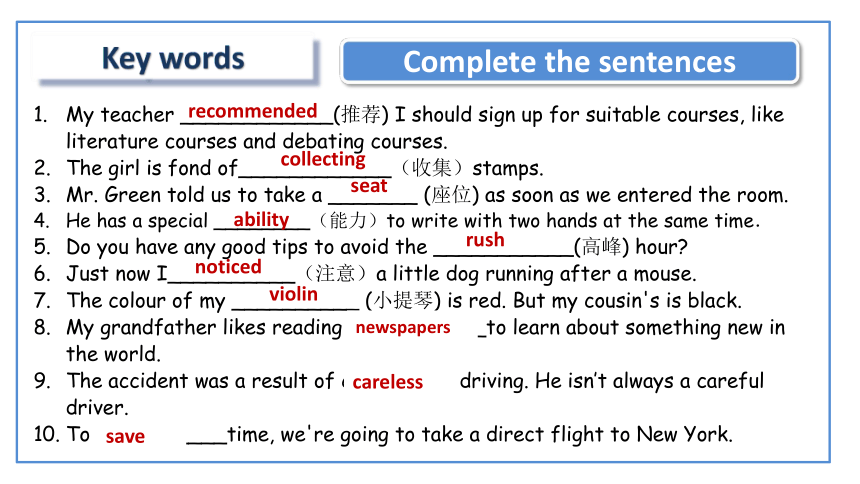
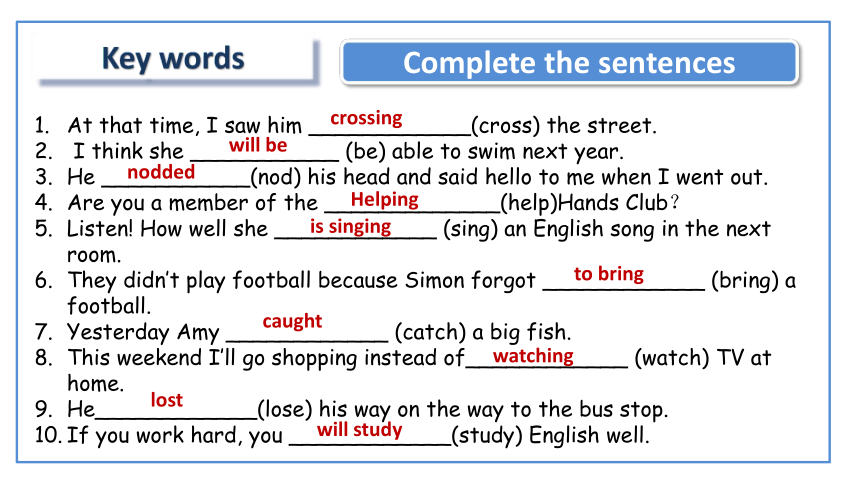
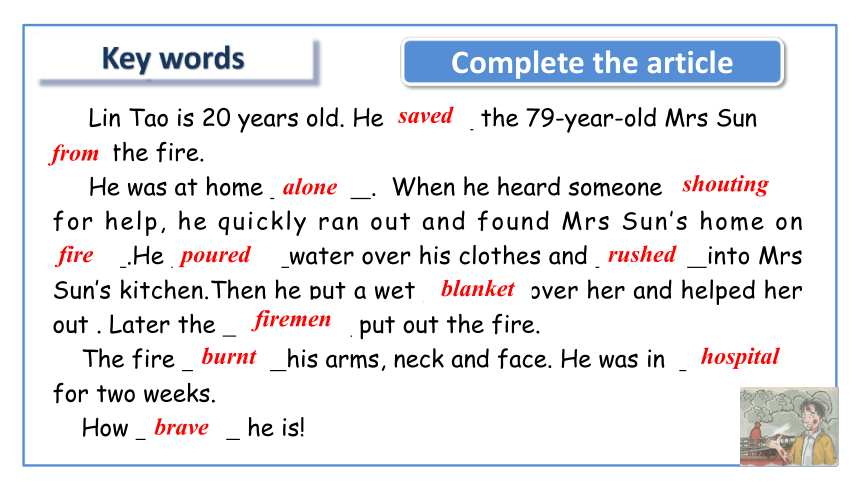
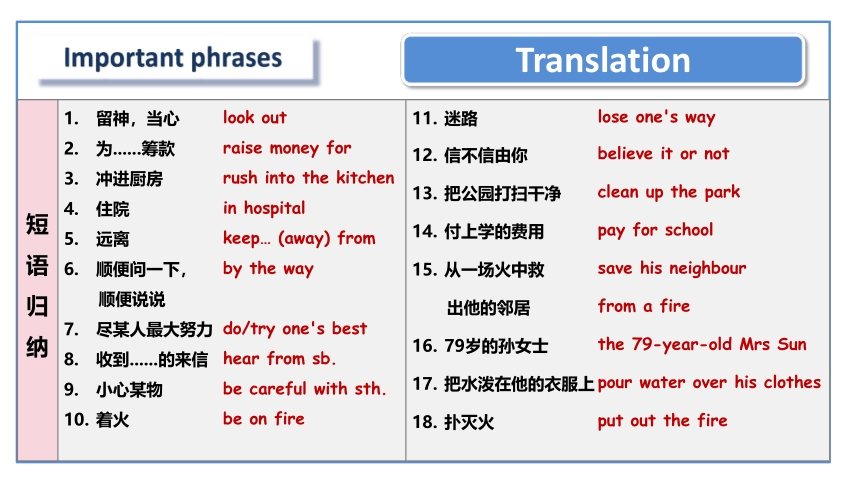
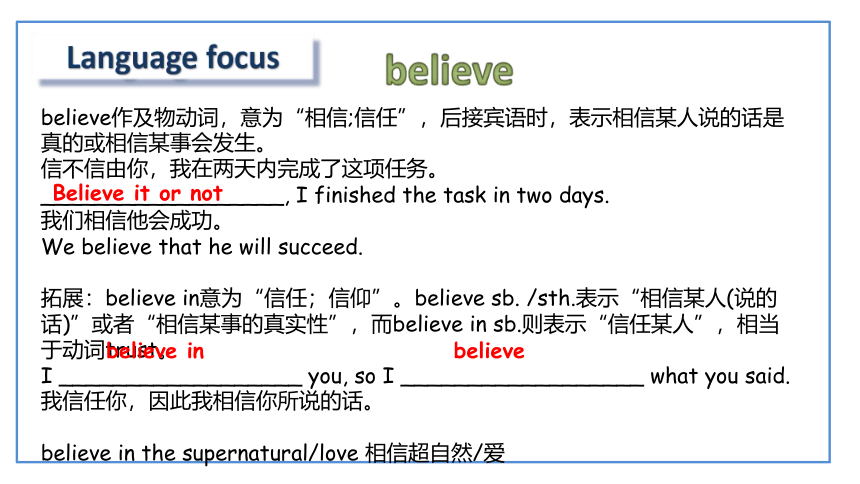
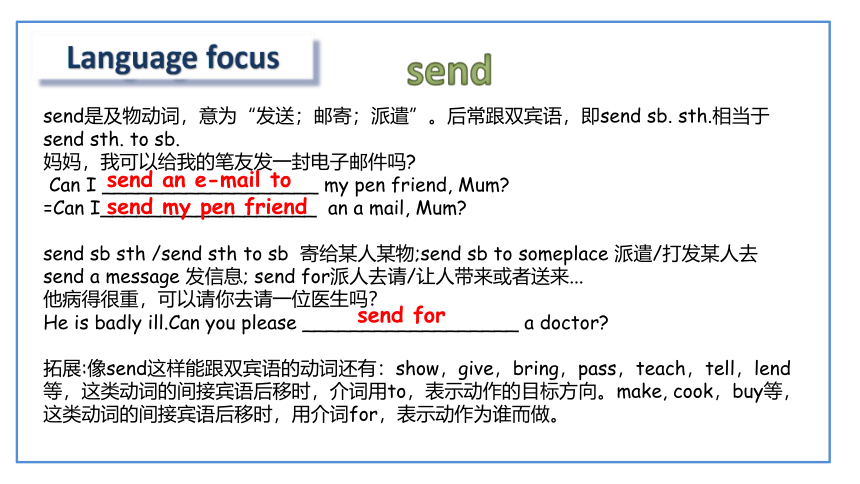
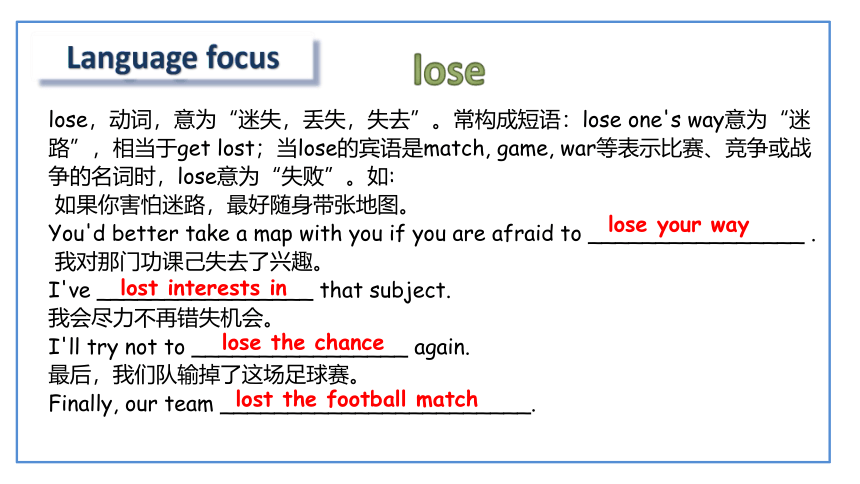
文档简介
(共27张PPT)
Unit 7 Abilities
Revision Lesson
Contents
Key words
Important phrases
Language focus
Grammar
Key words
My teacher ____________(推荐) I should sign up for suitable courses, like literature courses and debating courses.
The girl is fond of____________(收集)stamps.
Mr. Green told us to take a _______ (座位) as soon as we entered the room.
He has a special ________(能力)to write with two hands at the same time.
Do you have any good tips to avoid the ___________(高峰) hour
Just now I__________(注意)a little dog running after a mouse.
The colour of my __________ (小提琴) is red. But my cousin's is black.
My grandfather likes reading n__________to learn about something new in the world.
The accident was a result of c________ driving. He isn’t always a careful driver.
To s_________time, we're going to take a direct flight to New York.
recommended
collecting
seat
ability
rush
noticed
violin
newspapers
careless
save
Complete the sentences
Key words
At that time, I saw him ____________(cross) the street.[来源:
I think she ___________ (be) able to swim next year.
He ___________(nod) his head and said hello to me when I went out.
Are you a member of the _____________(help)Hands Club?[来源:Z。。
Listen! How well she ____________ (sing) an English song in the next room.
They didn’t play football because Simon forgot ____________ (bring) a football.
Yesterday Amy ____________ (catch) a big fish.
This weekend I’ll go shopping instead of____________ (watch) TV at home.
He____________(lose) his way on the way to the bus stop.
If you work hard, you ____________(study) English well.
crossing
will be
nodded
Helping
is singing
to bring
caught
watching
lost
will study
Complete the sentences
Complete the article
Lin Tao is 20 years old. He 1 the 79-year-old Mrs Sun 2 the fire.
He was at home 3 . When he heard someone 4 for help, he quickly ran out and found Mrs Sun’s home on 5 .He 6 water over his clothes and 7 into Mrs Sun’s kitchen.Then he put a wet 8 over her and helped her out . Later the 9 put out the fire.
The fire 10 his arms, neck and face. He was in 11 for two weeks.
How 12 he is!
saved
from
alone
shouting
fire
poured
rushed
blanket
firemen
burnt
hospital
brave
Key words
Important phrases
短 语 归 纳 留神,当心 为......筹款 冲进厨房 住院 远离 顺便问一下, 顺便说说 尽某人最大努力 收到......的来信 小心某物 着火 迷路
信不信由你
把公园打扫干净
付上学的费用
从一场火中救
出他的邻居
79岁的孙女士
把水泼在他的衣服上
扑灭火
look out
raise money for
rush into the kitchen
in hospital
keep… (away) from
by the way
do/try one's best
hear from sb.
be careful with sth.
be on fire
lose one's way
believe it or not
clean up the park
pay for school
save his neighbour
from a fire
the 79-year-old Mrs Sun
pour water over his clothes
put out the fire
Translation
Language focus
believe
believe作及物动词,意为“相信;信任”,后接宾语时,表示相信某人说的话是真的或相信某事会发生。
信不信由你,我在两天内完成了这项任务。
__________________, I finished the task in two days.
我们相信他会成功。
We believe that he will succeed.
拓展:believe in意为“信任;信仰”。believe sb. /sth.表示“相信某人(说的话)”或者“相信某事的真实性”,而believe in sb.则表示“信任某人”,相当于动词trust。
I __________________ you, so I __________________ what you said.我信任你,因此我相信你所说的话。
believe in the supernatural/love 相信超自然/爱
Believe it or not
believe in
believe
Language focus
send
send是及物动词,意为“发送;邮寄;派遣”。后常跟双宾语,即send sb. sth.相当于send sth. to sb.
妈妈,我可以给我的笔友发一封电子邮件吗
Can I __________________ my pen friend, Mum
=Can I__________________ an a mail, Mum
send sb sth /send sth to sb 寄给某人某物;send sb to someplace 派遣/打发某人去
send a message 发信息; send for派人去请/让人带来或者送来...
他病得很重,可以请你去请一位医生吗?
He is badly ill.Can you please __________________ a doctor
拓展:像send这样能跟双宾语的动词还有:show,give,bring,pass,teach,tell,lend等,这类动词的间接宾语后移时,介词用to,表示动作的目标方向。make, cook,buy等,这类动词的间接宾语后移时,用介词for,表示动作为谁而做。
send an e-mail to
send my pen friend
send for
Language focus
lose
lose,动词,意为“迷失,丢失,失去”。常构成短语:lose one's way意为“迷路”,相当于get lost;当lose的宾语是match, game, war等表示比赛、竞争或战争的名词时,lose意为“失败”。如:
如果你害怕迷路,最好随身带张地图。
You'd better take a map with you if you are afraid to ________________ .
我对那门功课己失去了兴趣。
I've ________________ that subject.
我会尽力不再错失机会。
I'll try not to ________________ again.
最后,我们队输掉了这场足球赛。
Finally, our team _______________________.
lose your way
lost interests in
lose the chance
lost the football match
Language focus
even
even,副词,意为"甚至”,放在表示意外的词前加强语气,可用来修饰动词或形容词。
主要用法有以下两种:
(1)用在比较级前,加强语气,表示程度。(比……)更,还要。
这本词典比那本更为有用。
This dictionary is __________________than that one.
我认为你能做的比我更好。
I think you can do __________________ than me.
(2)放在它所强调的词前,用来加强语气。表示“即使,甚至连……都”之意。如:
我甚至不知道你的名字。I don't even know your name.
即使小孩也能看懂那本书。Even a child can understand the book.
我作了全面的解释,但是甚至到现在她还不明白。
I explained everything, but even now she doesn't understand.
拓展:even now 即使到现在; even if/ though 即使 ; even so 即使如此
even more useful
even better
Language focus
leave
leave,动词,意为“离开”,后常跟地点作宾语,常构成短语leave for sp.意为“前往某地”;leave sp. for sp.意为“离开某地去某地”。
leave还可表示“遗忘”,常指因粗心而没带某物或把某物落在某处。常用结构为leave sth. at/in/on…意为“把某物忘在某个地方”。
leave也可表示“剩下,留下”之意;另外,leave还可用于结构“leave sb. /sth.十adj.”意为“使……处于……状态”。
我爸爸明天早上要动身去上海。
My father is _______________________ Shanghai tomorrow morning.
我昨天把钥匙忘在办公室了。
I _______________________ yesterday.
别担心。我们还剩下一些时间。
Don't worry. We still _______________________.
不要让门开着,今天很冷。
_______________________. It's very cold today.
leaving for
left my key in the office
have some time left
Don't leave the door open
Language focus
save
save, 动词,意为“救,救助”。常构成短语:save sb救某人;save sb. from从...救出某人;save one'slife救某人的命。 save,也可表示“储蓄,存钱,保存”。save,还可以表示“节省,节约”。
医生们正在尽力抢救这个垂死的男孩。
The doctors are _____________________________.
为了挽救那个女孩的生命,我们募集了许多钱。
We raised lots of money to _______________________ .
我打算每月把工资的一部分存起来。
I plan to _______________________each month.
他足够勇敢,在大火中救了他的邻居。
He was _______________________ his neighbour from a fire.
trying to save the dying boy
save the girl's life
save part of my salary
brave enough to save
Language focus
pay
pay some money for sth...花钱买...; pay a visit to 参观 ; pay attention to 注意,关心;pay off 偿还,还清;成功;盈利;贿赂;pay back 报复,报答,偿还
我能用信用卡支付吗
Can I pay by credit card
必须更加注意公路上的交通安全。
____________________________to safety on the roads.
总统正在对欧洲作私人访问。
The President is _____________________________.
她偶尔会雇人来整理花园。
She _______________________ do the gardening at times.
扩展:pay n.工资,薪水 pay phone 公用电话
More attention must be paid
paying a private visit to Europe
pays someone to
Language focus
spend/take/cost/pay 辨析
spend:主语为人,既可以指花时间也可以指花金钱.通常构成句型 spend some time/money (in) doing sth(花时间或金钱做某事);spend some time/money on sth (花时间或金钱在...方面上)
我花了四天时间完成这个项目。I spent four days ________________________.
玛丽花了20元买了这本书。Mary spent 20 yuan on this book.
take: 主语为物,只能指花时间。通常采取it做形式主语,构成it takes sb some time to do sth 的句型。
从苏州到云南的旅程花了我们一个星期。_____________________________ took us a week.
我每天做作业需要一个小时。It takes me one hour ____________________ every day.
cost:主语为物,只能指花金钱。通常构成sth cost (sb) some money
这本书花了我十元钱。The book _____________________________.
finishing the project
The trip from Suzhou to Yunnan
to do my homework
cost me ten yuan
Language focus
rush, 动词,意为“冲,奔”。
rush into 冲进......;rush out of 冲出..... ;rush to意为“向......冲去”。
rush 亦可以做名词,意为“ 匆促;急流”。rush hour 交通拥挤时间;in a rush 急急忙忙地,急速地;rush season 旺季,忙季
我生气地冲进了我的卧室。
I _____________________________ my bedroom angrily.
孩子们冲出了教室。
The children _____________________________ the classroom.
他受不了在交通最繁忙时出游。
He can't stand traveling _____________________________.
rush
rushed into
rushed out of
in the rush hour
Language focus
burn,动词,意为“烧伤;烧”,过去式为burnt 或burned。burn out 烧坏;burn down 烧毁,火力减弱;burn off 烧尽
我被炉子烫着了。
I _____________________________ on the stove.
他把他所有的旧书都烧掉了。
He _____________________________ all his old books.
许多人从着火的商店里跑出来。
Many people rushed from the _____________________________.
burn还可作名词,意为“烧伤;燃烧;灼伤”。
汤姆的右臂上有三处灼伤。
Tom has _____________________________ on his right arm.
burn
burned myself
burned
burning stores
three burns
Language focus
put out 熄灭;扑灭
Put out the fire before you go to bed. 睡觉之前记得灭炉火.
扩展:put away 把...收拾好;put up 搭建;put off 推迟;put in 安装;
put on 穿上
1. It’s raining hard. We’d better the sports meeting.
A. put on B. put off C. put up D. put out
2. They a tent by the fire.
A. put on B. put off C. put up D. put out
3. He his coat and went out.
A. put on B. put off C. put up D. put out
put out
Language focus
hurt
① hurt,及物动词,意为“使受伤,伤害”,宾语通常是某人、身体部位或人的情感。
小心别伤到你自己。
Be careful not ___________________.
我不是故意伤害你的感情的。
I didn’t mean to ___________________.
② hurt,不及物动词,意为“感到疼痛”。
她经常头疼。
Her head ___________________.
他经常晚饭后胃疼。
_____________________________ after supper.
③hurt,形容词,意为“受伤的”
我问他是否受伤了。
I asked him if _____________________________.
他的左膝在一次交通事故中受伤了。
His left knee ___________________ in a traffic accident.
was hurt
he was hurt
to hurt yourself
often hurts
His stomach often hurts
hurt your feelings
When he heard someone shouting for help, he quickly ran out and found Mrs Sun’s home on fire.
hear sb. doing sth. 表示“听见某人正在做某事”;
hear sb. do sth.表示“听见某人常做/做了某事”;
类似的词有:see/ watch/find ...
1.My father sees me (cross) the street and go into the school every day.
2. She was watching me (draw) pictures when someone knocked at the door.
cross
drawing
Language focus
hear
Language focus
hear
邻居们都听到呼救声。
All the neighbours ___________________________.
你能听见附近有人在喊叫吗
Can you __________________________in the neighbourhood
hear from为动词短语,意为“收.....的来信”,相当于get/receive a letter from,后面只能接表示人的词。
每周我收到两次叔叔的来信。I ______________________ twice a week.
hear of/about意为“听说”。
上周我听说了他的死讯。I ________________________ last week.
听说这则坏消息他们很震惊。They were shocked to _________________.
hear of the bad news
heard of his death
heard a call for help
hear someone calling
hear from my uncle
He can speak English very well.
He is able to speak English very well.
can, be able to 都可以表示能力
He can’t swim.
He isn’t able to swim.
can’t 除了表示“不能”,还可以表示 “不可能”, be not able to 只表示“没能力”
He could swim when he was five years old.
You must be able to speak French for this job.
can的过去时态用could,be able to 可用于多种时态,并且可以和其他情态动词搭配
Grammar
He can't be at home now.
He can’t swim before he finishes his work.
1.这小女孩会种树。
2.人们将能够更好地交流。
3.过去一些家庭没钱为孩子买书。
4.那人不可能是我们俱乐部的成员。
The little girl can / is able to plant trees.
People will be able to communicate better.
Some families couldn’t/ weren’t able to pay for the books for their children.
That person can’t be a member of our club.
Grammar
He can speak English very well.
He could speak English very well when he was young.
can, could都可表示能力
can, could, may 表示
请求允许
Can I borrow your bike
Could I borrow your bike
May I borrow your bike
Grammar
1.- I smoke here
-Sorry, you . I think it’s bad for your health.
A. Could; couldn’t B. Could; can’t C. Can; couldn’t D. Can; can
2.-Jim, can you show me how to cook fried fish
- . But you must listen and watch carefully.
A. Yes, I can. B. No, I can’t C. Yes, I can’t D. No, I can
3. - I watch TV now, mum
- No, you . You must finish your homework first.
A. May; mustn’t B. May; may not C. Could; couldn’t D. Can; can’t
-Could I... (表示请求允许)
-Yes, you can.
No, you can’t.
-May I... (表示请求允许)
-Yes, you may.
No, you can’t/mustn’t.
Grammar
Grammar
类别 结构 例句
what引导 What + a/an + 形容词 + 单数可数名词(+ 主语 + 谓语)! What a kind girl ( she is )!
(她是)一个多么善良的女孩啊!
What + 形容词 + 复数可数名词/不可数名词(+ 主语 + 谓语)! What beautiful flowers ( they are)!
多么漂亮的花!
What bad weather ( it is )!
多么糟糕的天气!
how引导 How + 主语 + 谓语! How time flies! 时间飞逝!
How + 形容词/副词(+ 主语 + 谓语)! How brave ( the hero is )!(这个英雄)真勇敢!How slowly he walks! 他走得多慢啊!
How + 形容词 + a/an + 单数可数名词(+ 主语 + 谓语)! How clever ( a boy he is )!
(他是)一个多么聪明的男孩啊!
Exclamation
1.—Look! clean the classroom looks!
—Yes. I’m sure somebody it up.
A. What;has cleaned B. How;has cleaned
C. What;cleaned D. How;cleaned
2. the wind is blowing!
A. What a strong B. How strong C. How strongly D. What strong
3. cool it is to take a photo with Superman!
A. How B. What C. What a D. How a
4. good news! Let’s tell it to our classmates.
A. How B. What C. What a D. How a
5. interesting sports programme on CCTV-5!
A. How B. What C. What an D. How an
Grammar
Unit 7 Abilities
Revision Lesson
Contents
Key words
Important phrases
Language focus
Grammar
Key words
My teacher ____________(推荐) I should sign up for suitable courses, like literature courses and debating courses.
The girl is fond of____________(收集)stamps.
Mr. Green told us to take a _______ (座位) as soon as we entered the room.
He has a special ________(能力)to write with two hands at the same time.
Do you have any good tips to avoid the ___________(高峰) hour
Just now I__________(注意)a little dog running after a mouse.
The colour of my __________ (小提琴) is red. But my cousin's is black.
My grandfather likes reading n__________to learn about something new in the world.
The accident was a result of c________ driving. He isn’t always a careful driver.
To s_________time, we're going to take a direct flight to New York.
recommended
collecting
seat
ability
rush
noticed
violin
newspapers
careless
save
Complete the sentences
Key words
At that time, I saw him ____________(cross) the street.[来源:
I think she ___________ (be) able to swim next year.
He ___________(nod) his head and said hello to me when I went out.
Are you a member of the _____________(help)Hands Club?[来源:Z。。
Listen! How well she ____________ (sing) an English song in the next room.
They didn’t play football because Simon forgot ____________ (bring) a football.
Yesterday Amy ____________ (catch) a big fish.
This weekend I’ll go shopping instead of____________ (watch) TV at home.
He____________(lose) his way on the way to the bus stop.
If you work hard, you ____________(study) English well.
crossing
will be
nodded
Helping
is singing
to bring
caught
watching
lost
will study
Complete the sentences
Complete the article
Lin Tao is 20 years old. He 1 the 79-year-old Mrs Sun 2 the fire.
He was at home 3 . When he heard someone 4 for help, he quickly ran out and found Mrs Sun’s home on 5 .He 6 water over his clothes and 7 into Mrs Sun’s kitchen.Then he put a wet 8 over her and helped her out . Later the 9 put out the fire.
The fire 10 his arms, neck and face. He was in 11 for two weeks.
How 12 he is!
saved
from
alone
shouting
fire
poured
rushed
blanket
firemen
burnt
hospital
brave
Key words
Important phrases
短 语 归 纳 留神,当心 为......筹款 冲进厨房 住院 远离 顺便问一下, 顺便说说 尽某人最大努力 收到......的来信 小心某物 着火 迷路
信不信由你
把公园打扫干净
付上学的费用
从一场火中救
出他的邻居
79岁的孙女士
把水泼在他的衣服上
扑灭火
look out
raise money for
rush into the kitchen
in hospital
keep… (away) from
by the way
do/try one's best
hear from sb.
be careful with sth.
be on fire
lose one's way
believe it or not
clean up the park
pay for school
save his neighbour
from a fire
the 79-year-old Mrs Sun
pour water over his clothes
put out the fire
Translation
Language focus
believe
believe作及物动词,意为“相信;信任”,后接宾语时,表示相信某人说的话是真的或相信某事会发生。
信不信由你,我在两天内完成了这项任务。
__________________, I finished the task in two days.
我们相信他会成功。
We believe that he will succeed.
拓展:believe in意为“信任;信仰”。believe sb. /sth.表示“相信某人(说的话)”或者“相信某事的真实性”,而believe in sb.则表示“信任某人”,相当于动词trust。
I __________________ you, so I __________________ what you said.我信任你,因此我相信你所说的话。
believe in the supernatural/love 相信超自然/爱
Believe it or not
believe in
believe
Language focus
send
send是及物动词,意为“发送;邮寄;派遣”。后常跟双宾语,即send sb. sth.相当于send sth. to sb.
妈妈,我可以给我的笔友发一封电子邮件吗
Can I __________________ my pen friend, Mum
=Can I__________________ an a mail, Mum
send sb sth /send sth to sb 寄给某人某物;send sb to someplace 派遣/打发某人去
send a message 发信息; send for派人去请/让人带来或者送来...
他病得很重,可以请你去请一位医生吗?
He is badly ill.Can you please __________________ a doctor
拓展:像send这样能跟双宾语的动词还有:show,give,bring,pass,teach,tell,lend等,这类动词的间接宾语后移时,介词用to,表示动作的目标方向。make, cook,buy等,这类动词的间接宾语后移时,用介词for,表示动作为谁而做。
send an e-mail to
send my pen friend
send for
Language focus
lose
lose,动词,意为“迷失,丢失,失去”。常构成短语:lose one's way意为“迷路”,相当于get lost;当lose的宾语是match, game, war等表示比赛、竞争或战争的名词时,lose意为“失败”。如:
如果你害怕迷路,最好随身带张地图。
You'd better take a map with you if you are afraid to ________________ .
我对那门功课己失去了兴趣。
I've ________________ that subject.
我会尽力不再错失机会。
I'll try not to ________________ again.
最后,我们队输掉了这场足球赛。
Finally, our team _______________________.
lose your way
lost interests in
lose the chance
lost the football match
Language focus
even
even,副词,意为"甚至”,放在表示意外的词前加强语气,可用来修饰动词或形容词。
主要用法有以下两种:
(1)用在比较级前,加强语气,表示程度。(比……)更,还要。
这本词典比那本更为有用。
This dictionary is __________________than that one.
我认为你能做的比我更好。
I think you can do __________________ than me.
(2)放在它所强调的词前,用来加强语气。表示“即使,甚至连……都”之意。如:
我甚至不知道你的名字。I don't even know your name.
即使小孩也能看懂那本书。Even a child can understand the book.
我作了全面的解释,但是甚至到现在她还不明白。
I explained everything, but even now she doesn't understand.
拓展:even now 即使到现在; even if/ though 即使 ; even so 即使如此
even more useful
even better
Language focus
leave
leave,动词,意为“离开”,后常跟地点作宾语,常构成短语leave for sp.意为“前往某地”;leave sp. for sp.意为“离开某地去某地”。
leave还可表示“遗忘”,常指因粗心而没带某物或把某物落在某处。常用结构为leave sth. at/in/on…意为“把某物忘在某个地方”。
leave也可表示“剩下,留下”之意;另外,leave还可用于结构“leave sb. /sth.十adj.”意为“使……处于……状态”。
我爸爸明天早上要动身去上海。
My father is _______________________ Shanghai tomorrow morning.
我昨天把钥匙忘在办公室了。
I _______________________ yesterday.
别担心。我们还剩下一些时间。
Don't worry. We still _______________________.
不要让门开着,今天很冷。
_______________________. It's very cold today.
leaving for
left my key in the office
have some time left
Don't leave the door open
Language focus
save
save, 动词,意为“救,救助”。常构成短语:save sb救某人;save sb. from从...救出某人;save one'slife救某人的命。 save,也可表示“储蓄,存钱,保存”。save,还可以表示“节省,节约”。
医生们正在尽力抢救这个垂死的男孩。
The doctors are _____________________________.
为了挽救那个女孩的生命,我们募集了许多钱。
We raised lots of money to _______________________ .
我打算每月把工资的一部分存起来。
I plan to _______________________each month.
他足够勇敢,在大火中救了他的邻居。
He was _______________________ his neighbour from a fire.
trying to save the dying boy
save the girl's life
save part of my salary
brave enough to save
Language focus
pay
pay some money for sth...花钱买...; pay a visit to 参观 ; pay attention to 注意,关心;pay off 偿还,还清;成功;盈利;贿赂;pay back 报复,报答,偿还
我能用信用卡支付吗
Can I pay by credit card
必须更加注意公路上的交通安全。
____________________________to safety on the roads.
总统正在对欧洲作私人访问。
The President is _____________________________.
她偶尔会雇人来整理花园。
She _______________________ do the gardening at times.
扩展:pay n.工资,薪水 pay phone 公用电话
More attention must be paid
paying a private visit to Europe
pays someone to
Language focus
spend/take/cost/pay 辨析
spend:主语为人,既可以指花时间也可以指花金钱.通常构成句型 spend some time/money (in) doing sth(花时间或金钱做某事);spend some time/money on sth (花时间或金钱在...方面上)
我花了四天时间完成这个项目。I spent four days ________________________.
玛丽花了20元买了这本书。Mary spent 20 yuan on this book.
take: 主语为物,只能指花时间。通常采取it做形式主语,构成it takes sb some time to do sth 的句型。
从苏州到云南的旅程花了我们一个星期。_____________________________ took us a week.
我每天做作业需要一个小时。It takes me one hour ____________________ every day.
cost:主语为物,只能指花金钱。通常构成sth cost (sb) some money
这本书花了我十元钱。The book _____________________________.
finishing the project
The trip from Suzhou to Yunnan
to do my homework
cost me ten yuan
Language focus
rush, 动词,意为“冲,奔”。
rush into 冲进......;rush out of 冲出..... ;rush to意为“向......冲去”。
rush 亦可以做名词,意为“ 匆促;急流”。rush hour 交通拥挤时间;in a rush 急急忙忙地,急速地;rush season 旺季,忙季
我生气地冲进了我的卧室。
I _____________________________ my bedroom angrily.
孩子们冲出了教室。
The children _____________________________ the classroom.
他受不了在交通最繁忙时出游。
He can't stand traveling _____________________________.
rush
rushed into
rushed out of
in the rush hour
Language focus
burn,动词,意为“烧伤;烧”,过去式为burnt 或burned。burn out 烧坏;burn down 烧毁,火力减弱;burn off 烧尽
我被炉子烫着了。
I _____________________________ on the stove.
他把他所有的旧书都烧掉了。
He _____________________________ all his old books.
许多人从着火的商店里跑出来。
Many people rushed from the _____________________________.
burn还可作名词,意为“烧伤;燃烧;灼伤”。
汤姆的右臂上有三处灼伤。
Tom has _____________________________ on his right arm.
burn
burned myself
burned
burning stores
three burns
Language focus
put out 熄灭;扑灭
Put out the fire before you go to bed. 睡觉之前记得灭炉火.
扩展:put away 把...收拾好;put up 搭建;put off 推迟;put in 安装;
put on 穿上
1. It’s raining hard. We’d better the sports meeting.
A. put on B. put off C. put up D. put out
2. They a tent by the fire.
A. put on B. put off C. put up D. put out
3. He his coat and went out.
A. put on B. put off C. put up D. put out
put out
Language focus
hurt
① hurt,及物动词,意为“使受伤,伤害”,宾语通常是某人、身体部位或人的情感。
小心别伤到你自己。
Be careful not ___________________.
我不是故意伤害你的感情的。
I didn’t mean to ___________________.
② hurt,不及物动词,意为“感到疼痛”。
她经常头疼。
Her head ___________________.
他经常晚饭后胃疼。
_____________________________ after supper.
③hurt,形容词,意为“受伤的”
我问他是否受伤了。
I asked him if _____________________________.
他的左膝在一次交通事故中受伤了。
His left knee ___________________ in a traffic accident.
was hurt
he was hurt
to hurt yourself
often hurts
His stomach often hurts
hurt your feelings
When he heard someone shouting for help, he quickly ran out and found Mrs Sun’s home on fire.
hear sb. doing sth. 表示“听见某人正在做某事”;
hear sb. do sth.表示“听见某人常做/做了某事”;
类似的词有:see/ watch/find ...
1.My father sees me (cross) the street and go into the school every day.
2. She was watching me (draw) pictures when someone knocked at the door.
cross
drawing
Language focus
hear
Language focus
hear
邻居们都听到呼救声。
All the neighbours ___________________________.
你能听见附近有人在喊叫吗
Can you __________________________in the neighbourhood
hear from为动词短语,意为“收.....的来信”,相当于get/receive a letter from,后面只能接表示人的词。
每周我收到两次叔叔的来信。I ______________________ twice a week.
hear of/about意为“听说”。
上周我听说了他的死讯。I ________________________ last week.
听说这则坏消息他们很震惊。They were shocked to _________________.
hear of the bad news
heard of his death
heard a call for help
hear someone calling
hear from my uncle
He can speak English very well.
He is able to speak English very well.
can, be able to 都可以表示能力
He can’t swim.
He isn’t able to swim.
can’t 除了表示“不能”,还可以表示 “不可能”, be not able to 只表示“没能力”
He could swim when he was five years old.
You must be able to speak French for this job.
can的过去时态用could,be able to 可用于多种时态,并且可以和其他情态动词搭配
Grammar
He can't be at home now.
He can’t swim before he finishes his work.
1.这小女孩会种树。
2.人们将能够更好地交流。
3.过去一些家庭没钱为孩子买书。
4.那人不可能是我们俱乐部的成员。
The little girl can / is able to plant trees.
People will be able to communicate better.
Some families couldn’t/ weren’t able to pay for the books for their children.
That person can’t be a member of our club.
Grammar
He can speak English very well.
He could speak English very well when he was young.
can, could都可表示能力
can, could, may 表示
请求允许
Can I borrow your bike
Could I borrow your bike
May I borrow your bike
Grammar
1.- I smoke here
-Sorry, you . I think it’s bad for your health.
A. Could; couldn’t B. Could; can’t C. Can; couldn’t D. Can; can
2.-Jim, can you show me how to cook fried fish
- . But you must listen and watch carefully.
A. Yes, I can. B. No, I can’t C. Yes, I can’t D. No, I can
3. - I watch TV now, mum
- No, you . You must finish your homework first.
A. May; mustn’t B. May; may not C. Could; couldn’t D. Can; can’t
-Could I... (表示请求允许)
-Yes, you can.
No, you can’t.
-May I... (表示请求允许)
-Yes, you may.
No, you can’t/mustn’t.
Grammar
Grammar
类别 结构 例句
what引导 What + a/an + 形容词 + 单数可数名词(+ 主语 + 谓语)! What a kind girl ( she is )!
(她是)一个多么善良的女孩啊!
What + 形容词 + 复数可数名词/不可数名词(+ 主语 + 谓语)! What beautiful flowers ( they are)!
多么漂亮的花!
What bad weather ( it is )!
多么糟糕的天气!
how引导 How + 主语 + 谓语! How time flies! 时间飞逝!
How + 形容词/副词(+ 主语 + 谓语)! How brave ( the hero is )!(这个英雄)真勇敢!How slowly he walks! 他走得多慢啊!
How + 形容词 + a/an + 单数可数名词(+ 主语 + 谓语)! How clever ( a boy he is )!
(他是)一个多么聪明的男孩啊!
Exclamation
1.—Look! clean the classroom looks!
—Yes. I’m sure somebody it up.
A. What;has cleaned B. How;has cleaned
C. What;cleaned D. How;cleaned
2. the wind is blowing!
A. What a strong B. How strong C. How strongly D. What strong
3. cool it is to take a photo with Superman!
A. How B. What C. What a D. How a
4. good news! Let’s tell it to our classmates.
A. How B. What C. What a D. How a
5. interesting sports programme on CCTV-5!
A. How B. What C. What an D. How an
Grammar
